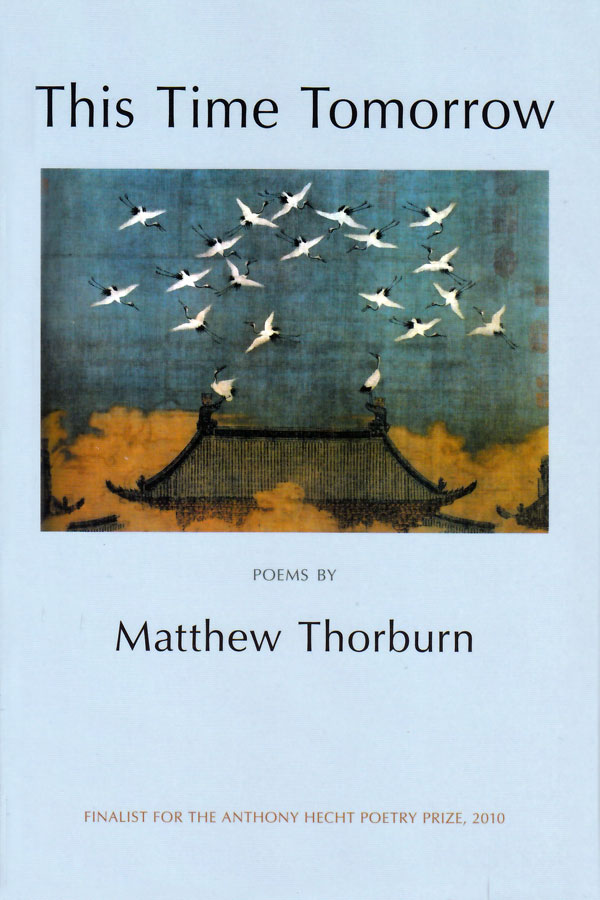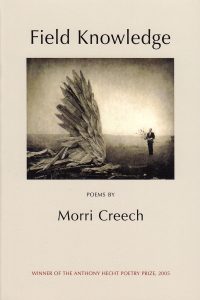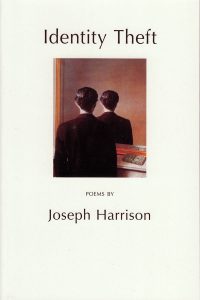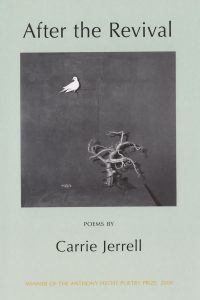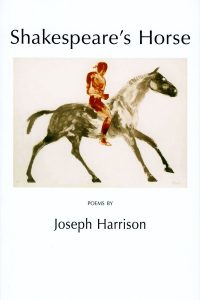This Time Tomorrow
£8.99
Finalist for the 6th annual Anthony Hecht Poetry Prize
This Time Tomorrow, Matthew Thorburn searches for his own particular answers to some fundamental questions: Why do we travel? Why seek out new places and cultures, only to have to leave them? Whether writing about Japan, China or Iceland, Thorburn brings his sharp eye and musical ear to the poet's work: honoring with words the mysteries and wonders – life's essential strangeness – to be found in whatever landscape we choose to wander.
Out of stock
This Time Tomorrow
“Matthew Thorburn’s This Time Tomorrow takes us on a journey of self-discovery – a physical journey over Icelandic water turned to barbaric glass by volcanic eruptions and, at the same time, a saga of Japan merging with memories of Asian things past – all cast in his particular calligraphic script. He cites Basho’s unhappiness at being ‘in Kyoto’ while, at the same time, ‘longing for Kyoto.’ Thorburn seems to lament that wherever he is physically, mentally he is elsewhere. Perhaps this is the indirectly stated point of his saga: Wherever we are we are not. Why not?” – Stanley Barkan
“Matthew Thorburn’s poems chronicle both what we think we’re looking for and how we look – a bittersweet journey that underscores our inability to stay, or be, in any one place for more than its moment, thus engaging what it means to be here at all. But if mistaking a billboard of Mt. Fuji for Mt. Fuji itself names the inauthentic in the search for the authentic, Thorburn’s poems also tell us wonderfully that a plastic leaf falling can allow us to hear birds singing. Because, finally, what his journey reveals is the desire that lies both with and as the source of artifice, the true feeling only encountered by taking our chances with the fleeting landscape of the heart.” – Maxine Scates
“This Time Tomorrow contains some of the best travel poems being written today. In vivid and surprising accounts of his travels, Thorburn’s eye for particulars never lets him down. He is a master of simultaneous action and perception. A dog-sled driver in Iceland rates equal billing with what the poet sees on the dog-sled ride, and the realities of present-day tourism become part of the story: ‘we sipped / instant coffee while he waited / for our Visa to go through.’ Gloria, disappointed in love in Kyoto, is as important as the famous temples and hermitages there. Matthew Thorburn is smart, alert and always good company on the road.” – Richard Tillinghast
“Matthew Thorburn’s This Time Tomorrow is a series of travelogues that are simultaneously internal and external. Though the poems are set in Iceland, Japan and China, and rich with fresh imagery of those places, his real subject is ‘the built-in sadness of travel,’ with ‘sadness’ conjuring the innate interiority of being in foreign lands. Like Basho he chronicles the way that passing through the physical world with genuine curiosity and openness can cause sudden rifts to open, yielding profound glimpses into human consciousness. In a voice that is inventive, natural, honest and always clear, Matthew Thorburn has given us an exciting extended meditation on what it means to study the ever-surprising geography of one’s own mind.” – Chase Twichell
Reviews of This Time Tomorrow
Terrain.org, June 2014
" … a surprising, insightful book of poems … The book’s pace is well-established in its first section: poems of unrhymed couplets and tercets intermixed with prose poems, all with attentive bits of history, food, culture, geography, and geology woven in and effectively jumbled about by jump-cuts of a mind wandering elsewhere … This Time Tomorrow dizzies and dazzles with twists and turns through the narrator’s now to his then to his might be. Thorburn’s book is a love affair with all three conceptions of time: real, not real, and imagined. For this I am glad, for that’s my experience, too." – Michael G. Smith
To read the whole of this review, please click the link: Read Full Review
Rattle, June 2014
"First, the confession: I’m a timid traveler, the most stubbornly stuck of sticks-in-the-mud. That timidity might underlie my distrust of grant-funded travel for the purpose of writing poems. It’s a prickly resistance I feel even while I admit that gorgeous poems can result. All this should be laid out honestly. I didn’t know, though, when I undertook to review Matthew Thorburn’s This Time Tomorrow, that I would be fighting past those prejudices – that I’d be reviewing a book of travel poems conceived during grant-funded travels to three countries. The knowledge I did have was the sort one gains gradually by noticing where, and how often, a poet’s name keeps showing up. I first became aware of it when Thorburn’s second book, Every Possible Blue, and my first were both brought out under the auspices of WordTech in 2012. And I remembered where I had already seen both the poet’s name and the book’s. In 2010, not one but two Thorburn manuscripts had been included in the longlist for the Anthony Hecht Prize awarded by The Waywiser Press. Every Possible Blue was one; This Time Tomorrow, now brought out by Waywiser, was the other. After a wait of eight years since the publication of his first full-length book Subject to Change, Thorburn now has two new books published within a year of each other, which is, as problems go, a pleasant one to have … [The poetry of This Time Tomorrow] is a poetry of narration, sudden incongruities, and games of association, rather than of music or technical flash. An occasional internal rhyme appears; the roughly similar line lengths and numbers of stresses in poems like ‘Little Thieves’ and ‘A Year in Kyoto’ are as close as we get to meter. More often, there are interesting games played with line breaks and interstanzaic enjambments, and with repetitions in which meaning is made to shift … It’s an approach that feels very true to the pointillist nature of memory, to the way it records – unpredictably, unreliably – the merest crumbs of experience. And the crumbs of beauty simply float past, never dwelt upon. ‘This is,’ says Thorburn, ‘the built-in sadness of travel: you can’t stay here’ no matter how you love it, and no matter how clearly you realize that your first understanding was flawed. From the book’s beginning, in the knowledge that the travelers’ ideas of Iceland were ‘all wrong,’ to its end atop Mount Misen, where the promised view is ‘lost to us’ and the travelers ask ‘Are we even here?’ Thorburn’s poems ask basic questions about the encounter with the world and what it means. For me, the stick-in-the-mud distruster of travel, these travel poems have the right idea. – Maryann Corbett
To read the whole of this review, please click the link: Read Full Review
The Warwick Review, September 2013
"This Time Tomorrow is filled with leviathan poems, mingling past and present in their exploration of the world … This is travel poetry, but [travel poetry] that questions constantly its genre and the concept of having a ‘complete’ experience …Thorburn combines anecdotes, metaphors and history in his capture of a place, holding them up as equally valuable … [T]his is an … assured collection." – Claire Trévien
Washington Independent Review of Books, 18 July 2013
"Thorburn writes of his travels to Iceland, Japan and China, recreating his life in different countries. This poetry travelogue is news of the day because the writer’s temperament allows us into his personal experience, through people, food, and landscape. He’s the pointman for us, for every grassy slope, every squirrel rifling through the leaves, every old man squatting in a steambed searching for clams. This is what it takes to be the guardian of detail within the challenge of foreign life. The best compliment I can give, not having been to these countries, is that Thorburn satisfies basic curiosity. What particular moments a poet chooses to pluck out of the daily scene is a matter of judgment, and Thorburn has exceptional taste, brokering every situation for the sake of the reader, making each poem a shared occasion. Old and new worlds are dovetailed without abstracting them beyond recognition. The book’s in three sections and in each he writes as if the reader is worthy of his time and deserves exact dimensions of what he sees." – Grace Cavalieri
Acumen, 76, May 2013
"… Thorburn understands that travel in poetic terms is not just map work with something egotistical to be grown from the stations arrived at, but a constant reminder of a mavellous and still-wider world within a universe. [His] choice of destinations attempts to tell us something about them while seeking reflections of the human self in topography and incident. Mist obscures the view on Mount Misen and ‘Small stones and coins / atop grave markers were reminders / the living can come and go. It was time / to hurry. Time to look / and l.eave.’ He almost forgets to set his stone but his companion places hers on top: ‘In one tradition, this might be / the way to heaven. You climb a path that circles / and circles, then disappears // into the fog. You could keep walking / to see if that was right.’" – Nigel Jarrett
Pylsur
–Reykjavík
That’s a hot dog with fried onions
(the kind that come in a can) and stripes
of brown mustard and mayo. We each
ate one standing outside the metal shack
down by the harbor. It’d become a tourist site –
seriously, a green bus pulled up; and after all
we were there, weren’t we? –
after Bill Clinton stopped by for a pyls
and a Coke a few years back.
They have his picture up over the register.
He must have done what we did –
turned around slowly till the wind
blew at his back and watched the whale watchers
straggling back in off the boat, gray-faced
in their yellow and blue slickers,
glanced past them to the Esso station –
odd how it’s the best place to get your hands on
cups of yogurty skyr, the ones with the smart
folding spoons tucked under the lids –
and wondered why are gas stations
also often restaurants here, the only lights on
in the smaller towns, and felt secretly happy
about this country’s love of burgers and dogs,
pizza, fries dipped in remoulade, even if
a hot dog sets you back seven bucks (he wouldn’t
have cared, or even known) because
everything’s shipped in and trucked around,
until the wind turns around again
so you do too, and wolf down your last two bites.
The Waywiser Press
Knock
Don’t linger over the colors of flowers.
They die too.
The river cuts around rocks, scrapes
its toothy blade along its flanks.
In a thousand, ten thousand years, this will be
a gully, a ravine.
And there are seeds picked up, carried by birds,
dropped far from here
and so, soon,
these trees grow there too.
Buson said leaves fall
and so they fell
as his lover went away.
The yawning space between two trees
is a door.
Knock and it swings open.
The Waywiser Press
Excerpts
Pylsur
–Reykjavík
That’s a hot dog with fried onions
(the kind that come in a can) and stripes
of brown mustard and mayo. We each
ate one standing outside the metal shack
down by the harbor. It’d become a tourist site –
seriously, a green bus pulled up; and after all
we were there, weren’t we? –
after Bill Clinton stopped by for a pyls
and a Coke a few years back.
They have his picture up over the register.
He must have done what we did –
turned around slowly till the wind
blew at his back and watched the whale watchers
straggling back in off the boat, gray-faced
in their yellow and blue slickers,
glanced past them to the Esso station –
odd how it’s the best place to get your hands on
cups of yogurty skyr, the ones with the smart
folding spoons tucked under the lids –
and wondered why are gas stations
also often restaurants here, the only lights on
in the smaller towns, and felt secretly happy
about this country’s love of burgers and dogs,
pizza, fries dipped in remoulade, even if
a hot dog sets you back seven bucks (he wouldn’t
have cared, or even known) because
everything’s shipped in and trucked around,
until the wind turns around again
so you do too, and wolf down your last two bites.
The Waywiser Press
Knock
Don’t linger over the colors of flowers.
They die too.
The river cuts around rocks, scrapes
its toothy blade along its flanks.
In a thousand, ten thousand years, this will be
a gully, a ravine.
And there are seeds picked up, carried by birds,
dropped far from here
and so, soon,
these trees grow there too.
Buson said leaves fall
and so they fell
as his lover went away.
The yawning space between two trees
is a door.
Knock and it swings open.
The Waywiser Press

